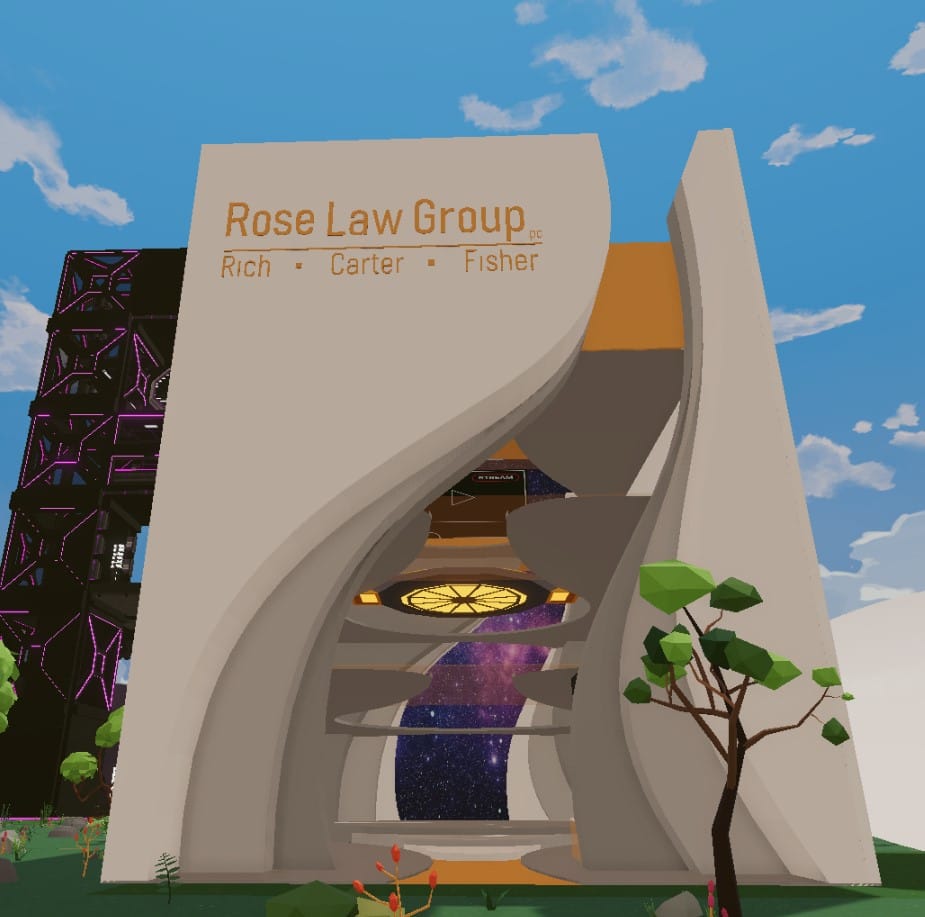
By Sarah Martinson | Law 360
Thompson Coburn LLP recently announced that it applied for trademark protection in the metaverse, making it the first major U.S. law firm to do so, but other firms have opened digital offices in virtual reality realms without taking this step.
Nearly a dozen law firms, including ArentFox Schiff LLP, Benesch Friedlander Coplan & Aronoff LLP, Arizona-based boutique Rose Law Group PC, New Jersey-based firm Grungo Colarulo LLC, New York City-based boutique Falcon Rappaport & Berkman PLLC, Pennsylvania-based personal injury firm Pond Lehocky Giordano LLP and family law firm Petrelli Previtera, have opened virtual offices, without filing applications at the U.S. Patent and Trademark Office for trademark protection in the metaverse.
However, the USPTO has more than 1,000 applications pending examination for trademark protection in the metaverse, from companies including Lowe’s, Mastercard, Mars Inc., Lululemon Athletica, Enterprise and Anheuser-Busch LLC, posing the question of what trademark protection brick-and-mortar brands need in virtual reality worlds.
Tom Polcyn, Thompson Coburn partner and co-chair of the firm’s intellectual property practice group, told Law360 Pulse in a recent interview that the firm’s filing for trademark protection in the metaverse is a good insurance policy against another firm opening an office in the metaverse with the name “Thompson Coburn.”
“We don’t know exactly what the metaverse is going to develop into from an economy perspective,” Polcyn said. “If it turns out we look back five years from now and say, ‘Well, we didn’t really need those. We were already well protected with our existing trademarks.’ We’ve spent a few bucks.”
But other firms don’t agree that they need to apply for trademark protection in the metaverse.

Jordan Rose, founder and president of Rose Law Group, which opened a virtual office in the metaverse in March, said in an email to Law360 Pulse that the USPTO and the courts haven’t indicated that companies need to apply for trademark protection in the metaverse.
“A law firm seeking trademark protection for its brand ‘in the metaverse’ is just engaged in a publicity stunt and has a misunderstanding of the nature of the metaverse itself,” Rose said.
The USPTO didn’t respond to a Law360 Pulse inquiry about whether it has guidance for companies about filing for trademark protection in the metaverse or if it will issue such guidance in the future.
Rose noted that it is appropriate for companies to seek trademark protection in the metaverse when they are seeking protection for new classes of goods such as digital shoes.
“That would be appropriate because shoes provided digitally are a different class of good than shoes in real life,” Rose said. “There is no reason to think that legal services provided digitally are a different class of legal services.”
According to Lululemon’s trademark application, dated May 5, the athletic apparel retailer is seeking trademark protection in the metaverse for several types of goods and services including “downloadable virtual goods” and “metaverse-based exercise classes.”
Richard Grungo, co-founder of Grungo Colarulo, which opened a virtual office in the metaverse in December, told Law360 Pulse in a recent interview that even though the firm didn’t seek trademark protection for its brand in the metaverse, it is going to seek trademark protection for “LawCity.com,” the metaverse’s first legal district, located in the virtual world Decentraland.
Grungo said the reason the firm is going to seek trademark protection for LawCity.com and not the firm itself is because LawCity.com is a new product that doesn’t exist outside the metaverse.
“Brand-new ideas is where you are going to more IP protection,” he said.
Law firms Benesch and Falcon Rappaport also confirmed to Law360 Pulse that they didn’t seek trademark protection in the metaverse before opening digital offices in the virtual space.
Mark Avsec, Benesch partner and vice chair of the firm’s intellectual property practice, said in an email to Law360 Pulse that the firm believes the rights it has in the physical world extend to the metaverse. “Trademarks accrue upon use, not filing,” Avsec said. “Our Benesch brand is protected in the physical world because we use it in interstate commerce. By extension, we believe we have rights in the virtual world too.”
Moish Peltz, Falcon Rappaport partner and co-chair of the firm’s IP practice, told Law360 Pulse in an email that deciding whether to apply for trademark protection in the metaverse is not always simple.
Peltz said that his firm has a trademark to provide legal services and believes that trademark will protect the firm wherever it provides legal services, including in the metaverse.
“Many businesses, including law firms, are making difficult choices over whether to extend their existing trademarks to cover their existing or planned activities in the metaverse,” he said.
–Editing by Robert Rudinger.





